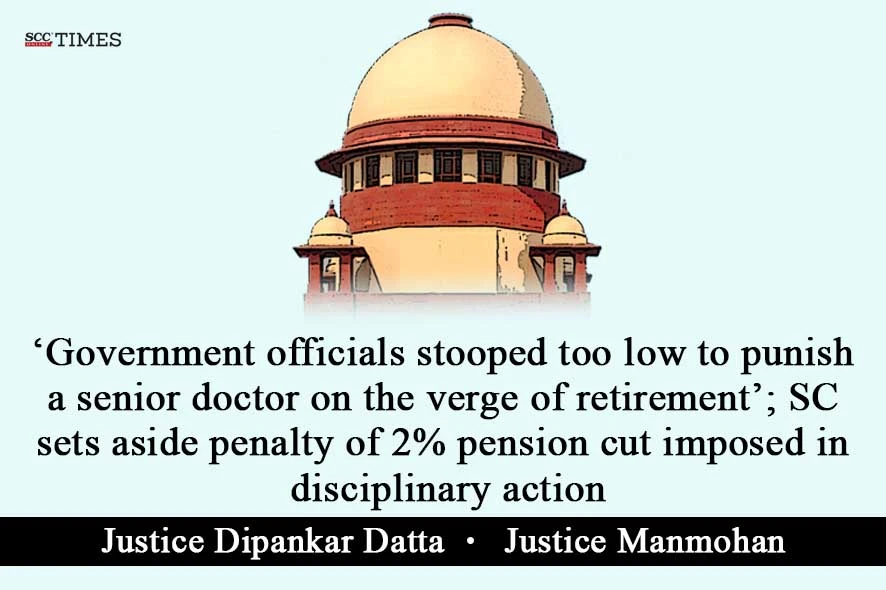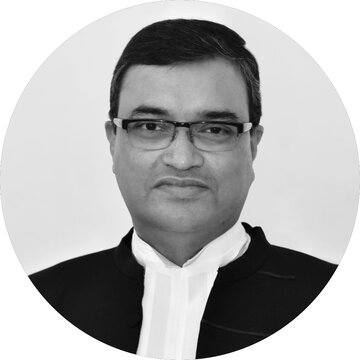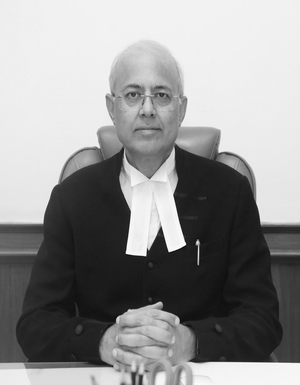Supreme Court: In a civil appeal against Punjab and Haryana High Court’s decision giving partial relief to the appellant by modifying the punishment from the penalty of a 2% pension cut with cumulative/permanent effect to a 2% pension cut for 5 years whereafter the appellant would be made entitled to a full pension, for alleged misconduct and taking unsanctioned leave, the Division Bench of Dipankar Datta and Manmohan, JJ. allowed the appeal and set aside the impugned decision. The Bench said that there was no record of the Civil Surgeon’s refusal to sanction leave being communicated to the appellant.
The Court held that the appellant shall be entitled to a full pension without any cut. Whatever quantum has been deducted from his pension shall be returned, within three months from the date, together with interest @ 6% per annum.
The Court stated that the matter at hand was a case where certain officials of the Government stooped too low to punish a senior doctor, on the verge of retirement, for no better reason than that he had dared to take on the mighty executive in a Court of law.
Background
The Punjab Health System Corporation issued instructions that the Specialist Doctors, General Medical Officers, or other Para Medical Staff shall not proceed on leave during the election and if it is required in special cases, it will be only with the prior approval of the Director.
The appellant was holding the post of Senior Medical Officer under the Health and Family Welfare Department, Government of Punjab (‘Govt. of Punjab’). Eleven days before the appellant’s retirement on superannuation on 31-03-2017, he was served with a charge sheet dated 20-03-2017 in connection with disciplinary action that was proposed against him under Rule 8 of the Punjab Civil Services (Punishment & Appeal Rules, 1970). It was alleged that he committed misconduct by (i) not complying with the direction of the Election Commission; (ii) proceeding on leave without sanction thereof; (iii) failing to take part in the pulse polio programme and giving threats for legal action to the Senior Assistant of the Civil Surgeon; and (iv) not complying with the orders of the superior officers. The inquiry officer submitted his report stating that except for the allegation of threatening to take legal action against the Assistant of the office of Civil Surgeon, the rest of the charges were proved.
The Principal Secretary, Health and Family Welfare Department, Govt. of Punjab, passed a final order ordering a 2% cut in pension with permanent effect. The appellant’s writ petition before the High Court was dismissed. In an intra-court appeal, the Division Bench of the High Court allowed the appeal in part by modifying the punishment from the penalty of a 2% pension cut with cumulative/permanent effect, the same was altered to a 2% pension cut for 5 years whereafter the appellant was made entitled to a full pension upon “completion of five years period from the date the inflicted punishment has been effected”.
Analysis and Decision
Regarding the objection by the State that limited notice was issued at the time of admission of the intra-court appeal, the Court said that limited notice was indeed issued by the Division Bench while admitting the intra-court appeal. However, on a reading of the impugned order, the Court said that it did not reveal that the Division Bench while disposing of such appeal considered the sole point on which limited notice was issued.
The Court stated that,
“issuing limited notice at the stage of admission does not bar a Constitutional Court having inherent powers to pass such orders as the justice of the case before it demands to enlarge the scope of a petition/appeal at the stage of final hearing.”
The Court explained that any observation made while entertaining the petition/appeal by issuing limited notice ought to be regarded as tentative and such observation would not limit the Court’s jurisdiction to consider the controversy, as raised, in its entire perspective. Whether or not the Court would enlarge the scope is, however, a question that is largely dependent on the facts and circumstances of each case. The Court stated that, if the Court considers that the justice of the case before it demands enlargement of the scope, notwithstanding that a limited notice had been issued earlier, the Court’s powers are not fettered particularly when enforcement of any Fundamental/Constitutional right is urged by the party approaching it.
Regarding the principles relating to interference with decisions taken in pursuance of disciplinary proceedings to discipline and control errant employees, the Court said that law is well settled that an administrative order punishing a delinquent employee is not ordinarily subject to correction in judicial review because the disciplinary authority is the sole judge of facts. However, if the Court is satisfied that there has been a violation of the principles of natural justice, or that the inquiry proceedings have been conducted contrary to statutory regulations prescribing the mode of such inquiry, or that the ultimate decision of the disciplinary authority is vitiated by considerations extraneous to the evidence and merits of the case, or that the conclusion of the disciplinary authority is ex facie arbitrary or capricious, so much so that no reasonable person could have arrived at such conclusion, or there is any other ground very similar to the above, the High Court may in the exercise of its discretionary power interfere with the order to set things right.
The Court relied on Union of India v. H.C. Goel, wherein it was observed that there can be little doubt that a writ of certiorari, for instance, can be claimed by a public servant if he can satisfy the High Court that the ultimate conclusion of the Government in the said proceedings, which is the basis of his dismissal, is based on no evidence; but the High Court can and must enquire whether there is any evidence at all in support of the impugned conclusion.
Placing reliance on Maneka Gandhi v. India and Madhayamam Broadcasting Ltd. v. Union of India, the Court observed that, in relation to disciplinary proceedings, subject to just exceptions, natural justice would envisage observance of procedural fairness before holding a public servant guilty of misconduct and imposing a punishment on him for such misconduct.
The Court noted that the appellant applied on 27-01-2017 for availing leave from 28-01-2017 to 31-01-2017 to attend proceedings pending before the High Court. The Court stated that leave is a matter regulated by rules and such rules need to be duly adhered to by each public servant. In the matter at hand, the appellant had not committed a serious misconduct. The Court pointed out that the letter dated 6-01-2017 of the M.D., PHSC did not prohibit the grant of leave to the Senior Medical Officer. The Court noted that the prosecution submitted that the Civil Surgeon had refused to sanction leave and that he was telephonically informed by the Senior Assistant of such refusal. Noting that the Inquiry Officer while exonerating the appellant of this charge reasoned that neither the Senior Assistant was produced in the inquiry as a witness nor were call details produced, hence, the Court said that this charge was not proved. Further, the Court said that on the same analogy and for the same reason, the charge of proceeding on leave without sanction, the appellant could not have been held guilty in respect of the second charge.
Going through the material on record, the Court noted that on cancellation of leave, no separate letter was written to the appellant; also, no duty had been assigned to the appellant in the pulse polio programme from 29-01-2017 to 31-01-2017. Insofar as defiance of the Election Commission’s directions by the appellant was concerned, the Court said that no such written directions were part of the documentary evidence led before the Inquiry Officer. Regarding the Inquiry Officer’s finding that the appellant was guilty for a perceived failure to perform a moral duty, the Court said that the same was completely extraneous, was clearly at variance with the charge levelled against the appellant.
Therefore, the Court set aside the impugned decision along with the order of dismissal passed by the Single Judge. The order of penalty passed by the appellant’s Disciplinary Authority was also set aside. The Court held that the appellant shall be entitled to full pension without any cut. Whatever quantum has been deducted from his pension shall be returned, within three months from the date, together with interest @ 6% per annum.
On the verge of retirement, election duty could not have been assigned to the appellant
Perusing the order dated 07-09-2016 issued from the office of the Election Commission of India, addressed to the Chief Secretary, Punjab on the subject of General Elections in Punjab, the Court noted therein, that- In any election very large number of employees are drafted for different type of election duty and the Commission has no intention of massive dislocation of state machinery by massive transfers. Hence, the aforesaid transfer policy is normally not applicable to officers/officials who are not directly connected with elections like doctors, engineers, teachers/principals etc.
Considering the same, the Court said that the M.D., PHSC could not have laid down a requirement contrary to what the Election Commission ordered. In all fairness, the Disciplinary Authority ought not to have initiated disciplinary proceedings against the appellant on the face of such clear order of the Election Commission. The appellant, therefore, was quite right in contending that the disciplinary proceedings culminating in the order of penalty were nothing but a ruse to wreak vengeance for having dragged high officials of the Government to the High Court and in tasting success to obtain his legitimate monetary dues. The Court observed that as the regulator and dispenser of special services and provider of a large number of benefits, none can perhaps deny that a welfare state ought to strive to achieve the maximum welfare and secure the best interests of the people. Therefore, the Court directed that the appellant shall be entitled to costs assessed conservatively at Rs.50,000/-, to be released in his favour within the aforesaid period.
CASE DETAILS
|
Citation: Appellants : Respondents : |
Advocates who appeared in this case For Petitioner(s): For Respondent(s): |
CORAM :








